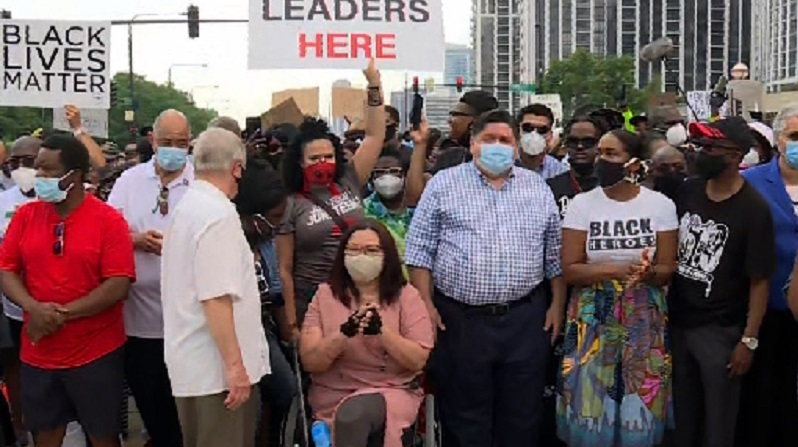A federal appeals panel says Gov. JB Pritzker is free to limit Republican political gatherings in the name of fighting COVID-19, but also allowed under the law to give more leeway to religious gatherings and Black Lives Matter protests, if he chooses.
On Sept. 3, a three-judge panel of the U.S. Seventh Circuit Court of Appeals rejected the arguments presented by the Illinois Republican Party and other plaintiffs that Pritzker had not improperly discriminated against them and other political organizations by refusing to allow them to gather in groups of more than 50 people while Illinois remains in a state of emergency because of the COVID-19 pandemic.
The Republicans sued earlier this spring, challenging the authority of Pritzker to limit their rallies and fundraising events that exceeded a 50-person limit he imposed by executive order. The limits on assembly sizes was one of the most prominent such orders Pritzker has issued since March, relying on his authority under state law to combat the spread of pandemic diseases, such as COVID-19.
Pritzker has said such gathering size limits are needed to make it harder for the coronavirus that causes COVID-19 to spread.
In their lawsuit, the Republicans asserted Pritzker has not equally applied the limits. They noted the governor has carved out special exceptions for some religious assemblies.
And, they said, Pritzker himself has violated the order by participating in an anti-racism march in Chicago, during which thousands of people gathered in the streets. They said the governor has also endorsed more of such gatherings, and has done nothing to limit the size of the protests, marches and rallies in the name of the Black Lives Matter movements.
They said this has created a situation in which the governor has indicated a will to enforce the anti-COVID measures based on the content of the speech being delivered by those assembling, and has tilted that bias in favor of those with whom he aligns politically.
When the case landed in Chicago federal court, U.S. District Judge Sara Ellis sided with the governor.
And on appeal, the Seventh Circuit judges also backed Pritzker’s position, that he has the authority to essentially take any measures he deems necessary to combat COVID-19 and save lives.
In the ruling, the judges reaffirmed that religious organizations and assemblies enjoy special privileged status under the First Amendment, even greater than the deference and protections typically afforded to political speech under the Constitution.
While religious practice often involves speech that should be protected by the First Amendment, the judges said the First Amendment goes farther, protecting the free exercise of religion itself.
They said comparing ordinary speech, and even political speech, to religious exercise, does not yield an “apples to apples” comparison.
“What we see instead is ‘speech’ being compared to ‘speech plus,’ where the ‘plus’ is the protection that the First Amendment guarantees to religious exercise,” Judge Wood wrote.’
However, they noted not all activities hosted by a church – such as a picnic or “battle of the bands” - would necessarily be protected, simply because they are hosted by a church.
And the judges emphasized the governor also still has the authority under the Constitution and the law to impose public health restrictions on religious practices. They pointed to a decision the Seventh Circuit delivered earlier this year, which stated the court believes Pritzker and other governors have no obligation to exempt religious gatherings from COVID-19 prevention measures imposed on businesses and other organizations and assemblies.
However, they said the governor was also free to give religious gatherings greater leeway, compared to other otherwise First Amendment-protected activities, because of the special “speech-plus” status the First Amendment grants to religious exercise and practice.
The law, the judges said, “does not compel the Governor to treat all gatherings alike, whether they be of Catholics, Lutherans, Orthodox Jews, Republicans, Democrats, University of Illinois alumni, Chicago Bears fans, or others,” Judge Wood wrote. “Free exercise of religion enjoys express constitutional protection, and the Governor was entitled to carve out some room for religion, even while he declined to do so for other activities.”
The judges also rejected the attempt to compare the Republican events to Black Lives Matter protests.
They said the governor’s endorsement of the protests and marches, nor his participation in them, is enough to “change the law” or to “change the text of the order.” The judges said the Republicans did not present enough proof that Pritzker and the state government actively allowed the Black Lives Matter protests favored by left-wing Democrats like Pritzker, while shutting down equivalent demonstrations from the other side of the political spectrum.
“Underenforcement claims are hard to win…,” the judges noted. “Although we do not rule out the possibility that someone might be able to prove this type of favoritism in the enforcement of an otherwise valid response to the COVID-19 pandemic, the record in this case falls short.”
The judges said Pritzker, in his role as chief executive of Illinois, has wiggle room within the law to enforce and manage his gathering limits rules as he has done to this point.
“The entire premise of the Republicans’ suit is that if the exemption from the 50‐ person cap on gatherings for free‐exercise activities were found to be unconstitutional … they would then be free to gather in whatever numbers they wished,” the judges wrote. “But when disparate treatment of two groups occurs, the state is free to erase that discrepancy in any way that it wishes.
“In other words, the state is free to ‘equalize up’ or to ‘equalize down.’”
The Republicans have been represented in the case by attorneys with the Liberty Justice Center, of Chicago.
Pritzker has been represented by the Illinois Attorney General’s Office.
